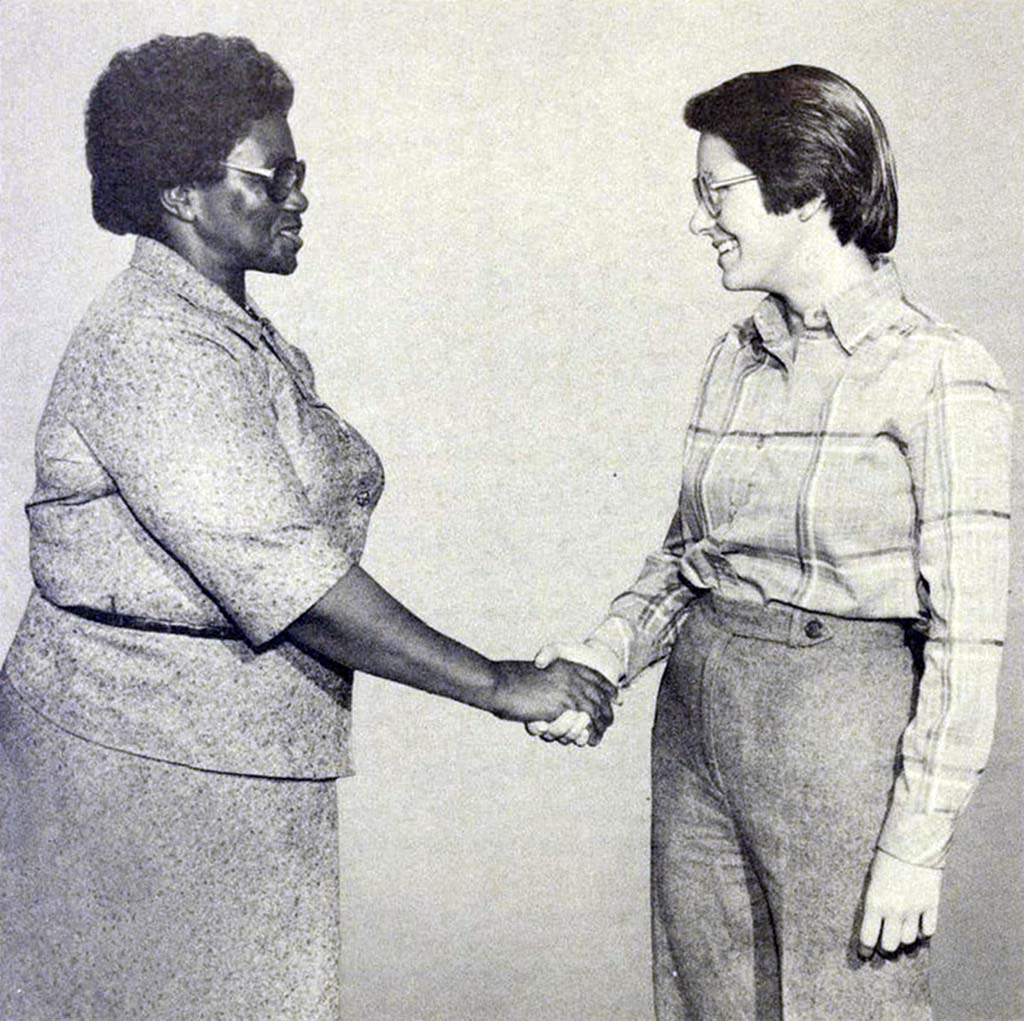By the 1970s Lucy Mvubelo had become a powerful force in the black South African Labor Union Movement. Born in Johannesburg in 1920 she first joined the Garment Workers Union in 1946 and eventually became the first black woman on the National Executive Council of the Trade Union Council of South Africa. Ten years later she helped organize one of the largest anti-apartheid demonstrations to that point, some 20,000 people who marched in Pretoria to protest pass laws. In the address below which was prepared for (but not delivered) to the International Labor Organization meeting in Geneva, Switzerland, on June 15, 1973, she outlines what other workers groups around the world can do to undermine Apartheid.
Mr. President, Ministers of different portfolios, and fellow workers. I wish to thank first and foremost all those who have been instrumental in giving me the privilege of speaking at this workers’ parliament, and you, Mr. Chairman, and all the Trade Union movement, which has shown great concern over the problems of black workers in South Africa.
My purpose in coming before you is to correct the record and to make the truth known to all as interested working class. I am a trade unionist and a worker who knows how the ordinary African worker suffers under the discriminatory and harmful effects of apartheid in South Africa, because I am a practicing union leader in South Africa.
I represent over 18,000 African workers employed in clothing factories in Johannesburg. Fortunately, my union also has members in the predominantly Nationalist area of the Orange Free State and Northern Cape. It is unfortunate that at this stage clothing factories established in the newly formed Bantustans or homelands cannot be organized in terms of the legislation, and the claim of the South Africa government that they are looking after these workers’ conditions and wages. I repeat that it is unfortunate, because many of my union members were taken to these areas to train workers. I have to deal daily with the problems of the workers under the apartheid system. I am not fortunate enough to look at them from outside South Africa or from a position of safety and distance; this is why I can speak with sincerity, feeling and authority, because I am there and not somewhere else.
For years I have heard all the arguments, the proposals and suggestions for removing the apartheid system and I must express my doubts as to whether what has up until now been suggested be either desirable or effective for me or my fellow African workers in South Africa. I do not discount the help and assistance which could be furnished by well-meaning people and organizations who desire what I personally want, but any program and action for the elimination of apartheid, and the improvement of the black workers’ conditions of life, must be jointly planned with the actual representation of the resident South African workers. This will be the only effective way to bring change and the elimination of the apartheid system.
Don’t isolate us, don’t break off contact and don’t advocate disengagement and withdrawal of foreign investments, because you will still be talking in another ten years’ time and the situation in South Africa will not have changed to any degree. The trade union movement in South Africa for Africans, coloreds, Indians and whites is the only instrument which will bring about change, and this is what must be considered and must be achieved. This was demonstrated by African, colored and Indian workers in the recent strike actions which took place in Durban, Johannesburg and other major urban areas. These workers proved to the world that they need trade union rights, and also that the economy of the country depended on their labor. In short, there are over 400,000 black workers who are ready to be unionized. What they need is leadership.
Investments from foreign countries have created job opportunities for thousands of African workers who would otherwise have been unemployed. Thanks to the pressure of trade unions in these foreign countries, black workers employed in these foreign companies have recently gained large wage increases, much larger than the wage increase obtained by black workers employed by South African companies.
In the textile and clothing industries, the minimum wage of a male worker has been increased from R8,50 per week to R20,00 per week. Married workers get another R2 per week plus R1,50 for each child up to four children. This brings the minimum wage up to R29 per week. Workers are given educational bursaries for their children for high school and universities.
I appeal to our trade union colleagues not to make the task of the black people of South Africa more difficult by asking for withdrawal of these companies from South Africa, or for boycotting South African goods. By so doing, the black workers will lose their employment and the government will tell them that their jobs have been closed by the insistence of their fellow trade unionists overseas. We are all against apartheid, but do not make the life of African, colored and Indian workers unbearable by throwing them out of work.
Knowing the conditions and the South African policy, may I make use of an old adage that governments come and go, and so the policies of the government may also change, but the policy of the trade union movement shall always be one. Hence my contention is that the I.L.O. Workers’ Committee should hold a dialogue with the non-racist South African Federation of Trade Unions, which will lead to a better understanding and education, not only for South Africa, but for all other countries who suffer at the hands of segregation and apartheid.

